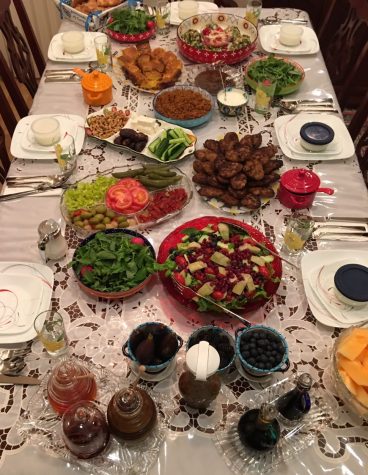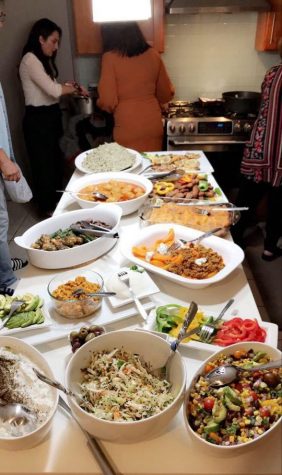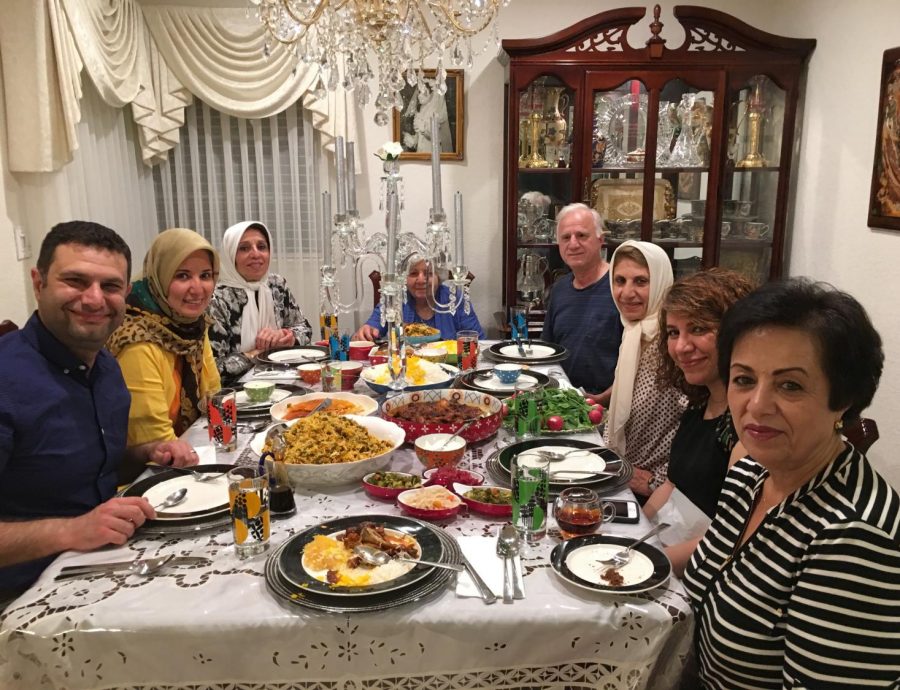Ramadan hits home during COVID-19 shelter-in-place
Professor Dada and her loved ones eating together for eftar.
When the ninth month of the Islamic calendar began in April, Muslims who observe Ramadan knew their observance would be different this year due to COVID-19 restrictions.
Ramadan, which began April 23 and extends through May 23, is a sacred month for observant Muslims who spend 30 days of fasting from dawn to dusk. The month is used as a time for frequent prayer and gathering with loved ones to eat after the sun sets.
With the California shelter-in-place order extended through April and May in order to prevent the spread of COVID-19, traditional Ramadan gatherings and festivities have become difficult for Muslims to celebrate regularly.
“One of the traditions of Month of Ramadan (maah Ramezan, as we pronounce it in Farsi) is having feasts: being invited and inviting family and friends for dinner (eftar),” said Farideh Dada, journalism instructor and campus media adviser at San Jose City College in an email interview. “Because of social distancing, we can’t do it this year.”

Beautiful table setting for eftar.
Despite changes in celebration caused by the shelter-in-place order, Dada said that some aspects of Ramadan have become less difficult.
“Abstaining from eating and drinking from dawn to dusk is hard, especially if you spend your time outside, in traffic, in pollution, in heat, etc.,” said Dada. “Shelter in place has made it easier for me to fast by staying in a comfortable environment – my home.”
In addition to not being able to physically gather with family and friends, all mosques in the Bay Area are closed.
To combat this challenge, some mosques are hosting Ramadan celebrations virtually, such as the SABA Islamic Center, which provides online children’s programs and recitations from the Quran.
Deedah Rahnuma, 19, communications major said that she feels a sense of togetherness in the creative ways in which the Muslim community has had to adapt its Ramadan celebrations.

Deedah’s whole family from the Bay Area coming together to break fast with her mother’s delicious food.
“We would do anything that we could to get somewhat contact with somebody,” she said. “That is one thing in our culture that we love to do, we don’t like to lose connection, even when something like this happens, we always want to keep together.”
Gatherings with loved ones have changed to remote video calls using services like Zoom to stay connected with family throughout the month of Ramadan.
Yalda Asadi Sorkhab, 18, biological science major said she misses seeing her loved ones in person rather than through a screen.
“I miss the talking, how we can talk to each other because I don’t like talking online or on zoom or call, I like face-to-face talking, so I miss that a lot,” she said. “I also miss going out and like going on adventures with my friends that are in the same community.”
Despite the difficulties and challenges that adapting Ramadan celebrations to COVID-19 restrictions has brought upon the Muslim community, Rahmuna said this time has made her appreciative of what she has in her life that others may not.
“I think God did this for a reason, especially for this pandemic to happen during this time,” said Rahnuma. “This is also to make us realize, manifest, grow, and to just take care of ourselves because we can’t take anything for granted.”
Dada said she shares the same sentiment and is thankful for what she has.
“It’s also the time to be grateful for what you have in life and feel empathy and help those who are less fortunate,” she said.



